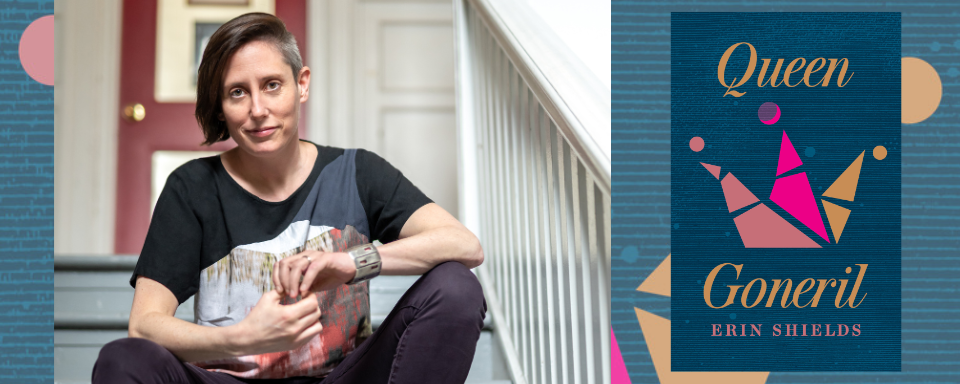
Author Interview: Erin Shields
To celebrate International Women’s Day, we chatted with award-winning playwright, Erin Shields, about her latest book that has taken readers by storm, Queen Goneril.
Queen Goneril is a prequel to Shakespeare’s King Lear that centers the narratives of his three daughters: Goneril, Regan, and Cordelia. An interesting fact about you is that you also grew up with three sisters! Did those relationships inspire you to write this play? How did this aspect of your life feed into the writing of this story?
Erin:
Yes, I’m the eldest of four girls and I really think birth order in a large family plays a huge role in the people we become. I was able to channel those relationships when creating and writing the three sisters, capturing the love and support but also the incredible ability close sisters have to delight in annoying the hell out of one another. Even when the sisters in Queen Goneril are calling each other out, it’s in order to make one another face truths they wouldn’t be able to see on their own. And ultimately, they are each a rock for one another, which is exactly how I feel about my sisters.
There are 3 women to 19 men in any given Shakespearean play. Aside from a handful of notable stand-outs, Shakespeare is undoubtedly lacking the same amount of juicy roles for women than it offers to men. In your opinion, who is the most dynamic female character in Shakespeare’s canon and why? If you were to write a play centering her narrative, what aspects of her character would you want to explore more?
Erin:
I think some of Shakespeare’s most dynamic female characters – Rosalind in As You Like It, Viola in Twelfth Night, Portia in The Merchant of Venice – don’t really need another narrative. They are all clever, active and capable of falling in love and doing whatever they need to do to get what they need. It probably helps that these three characters all disguise themselves as men to get the job done! Perhaps I wouldn’t marry them off quite so easily at the end of their respective plays, but aside from that, I’m happy to go on the journey Shakespeare wrote for them.
Ophelia, on the other hand, should definitely get a chance to take centre stage. She spends all of Hamlet being ordered about by the men in her life – her father, her brother, her lover, her king – and trying to follow their many conflicting instructions is what leads to her unravelling. Wouldn’t it be great if Ophelia had seven soliloquies to contemplate the meaning of life? Why are we here? What does it all mean? What a piece of work is wo-man!
In recent years, we’ve been seeing more of a shift in the representation of women in media with characters that are more fulsome, complex, outspoken, autonomous, etc. What interesting changes have you noticed in representation and is there a work of art you’ve experienced lately that you feel has really successfully detached itself from the male gaze?
Erin:
Queen Goneril was commissioned by Soulpepper Theatre as part of its Six Women Writing Program and was workshopped at the Her Words Festival. Every time I met with the five other writers in the program, I was deeply inspired by the stories and processes of each writer. Attending the Her Words Festival this past year to see what some of those women had created was so energizing. Kat Sandler’s Wildwoman, Sandra Caldwell’s The Guide to Being Fabulous, and Raha Javenfar’s Sympathy for the Devil all offered exciting, refreshing and completely unique stories that expand notions of what it is to be a woman and how to communicate with an audience.
Your feminist re-examinations of Shakespeare’s work continues with another new play you’ve penned called Thy Woman’s Weeds that will have its world premiere production in Montréal from April 23rd to May 12th, 2024 at Centaur Theatre in partnership with Repercussion and Tableau D’Hôte. Can you tell us a little bit about this play and what excites you about it?
Erin:
Yes, this is definitely my Shakespeare-phase! I began writing Thy Woman’s Weeds back in 2017. It was a commission from Repercussion Theatre in Montreal and was a way for me to explore the relationship of women to Shakespeare. I was interested in looking deeply at the female characters in Shakespeare’s plays and the way the fewer number of female roles affect those stories and the actors performing them. The writing began with workshops with female actors who all had SOOOO many stories to tell about working on Shakespeare. A lot of laughter, a lot of venting, a lot of rage later, I wrote what became a satire about the whole thing – the characters, the actors, the directors, the audiences that love Shakespeare but come face to face with constraints he faced when writing in a time when women weren’t even allowed to perform.
If I’m being honest, I’m getting bored with watching traditional Shakespeare as a theatre goer. Just by living in Toronto, I’ve already seen King Lear five times! Queen Goneril feels so much more vibrant, relevant and accessible for today’s audiences. Given that there is a huge gender imbalance in Shakespeare’s work and he is still the most produced English playwright, do you think theatre culture would benefit from a moratorium on traditional Shakespeare texts?
Erin:
I had the extraordinary experience of working on Much Ado About Nothing directed by Chris Abraham on the Festival Stage at Stratford last year. I wrote a bit of extra text for the production to give voice to Hero, a silenced female character, but for the most part, it was all Shakespeare. What Chris, the actors and the entire team were able to accomplish with that production was transcendent. It felt “traditional” in the sense that it was set in an early-modern Messina. The set and costumes were in the world of what one might expect when seeing a Shakespearean play at Stratford. But if people were expecting to see something dusty, sleepy or difficult to understand, they were in for a complete surprise! The production was busting at the seams with joy and sex and gut-splitting hilarity. People were screaming with laughter and really gunning for the characters.
So no, I don’t think we should do away with the “traditional” texts. But “traditional” shouldn’t mean dead or frozen in some imagined Elizabethan time. The words are buzzing with life. Our productions should be too.
Saying all that, of course we should do NEW plays as well. As many as possible. And ALL the theatres should be actively commissioning that work to give voice to our current preoccupations and desires. I want to work in a theatre ecology that offers up vibrant productions of classical plays AND startling, illuminating works by contemporary playwrights.
***
Order your copy of Queen Goneril today!
Erin Shields is a Canadian playwright best known for radical adaptations of classical texts which bring neglected female characters centre stage. Her additional text for Shakespeare’s Much Ado About Nothing at The Stratford Festival gives a voice to silenced Hero at the climax of the play. Queen Goneril, which premiered at Soulpepper Theatre in rep with King Lear, centres Lear’s stifled daughters as they contend for power in a world that insists they remain powerless. Erin’s illuminating and hilarious adaptation of Paradise Lost (Stratford Festival), won the Quebec Writers Federation Prize for Playwriting. And her harrowing tragedy about sexual violence, If We Were Birds, won the Governor General’s Award for playwriting. Other plays include: Jane Eyre (Citadel Theatre), Piaf/Dietrich (Mirvish Productions/Segal Centre), Beautiful Man (Factory Theatre), The Lady from the Sea (The Shaw Festival), The Millennial Malcontent and Soliciting Temptation (Tarragon Theatre) and Instant (Geordie Theatre).
Erin’s plays are published by Playwrights Canada Press and you can read more about upcoming projects on her website – www.erinshields.ca.



Comments